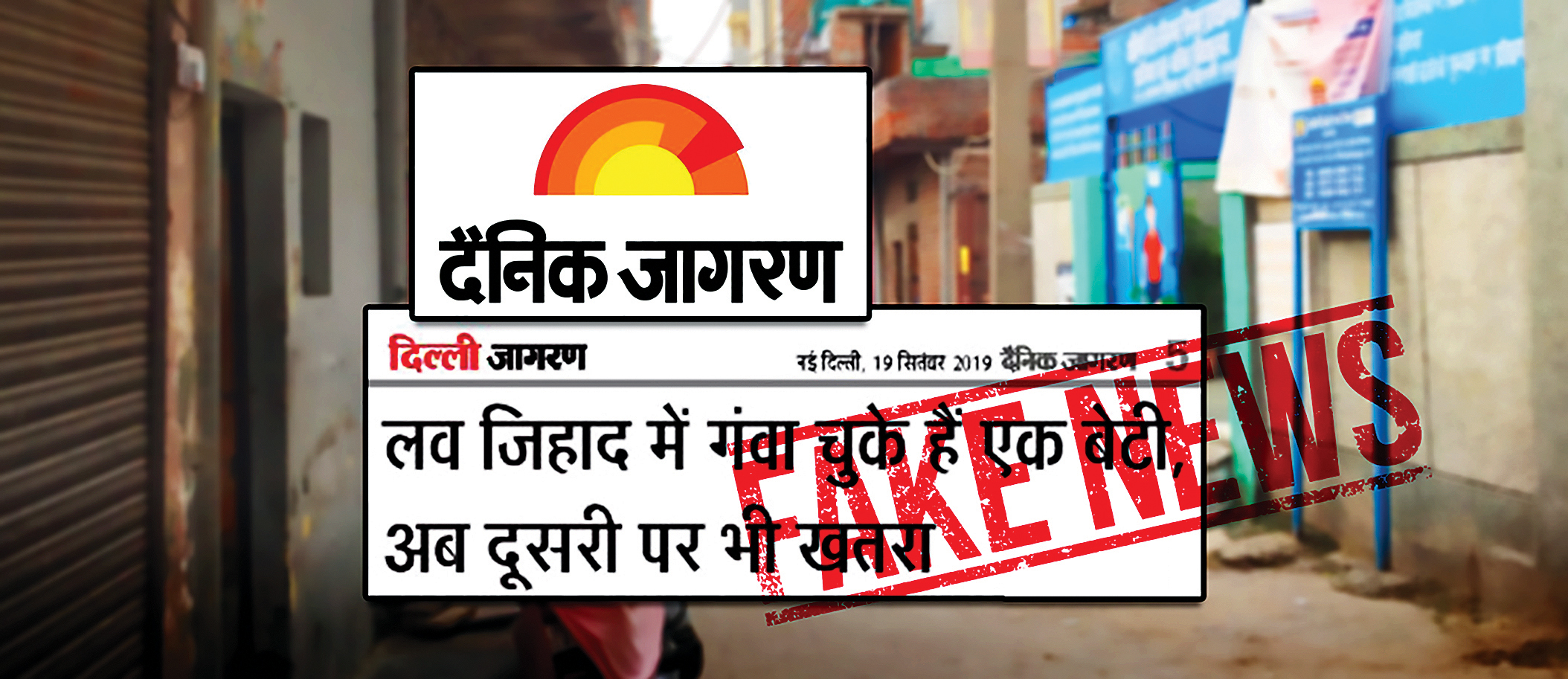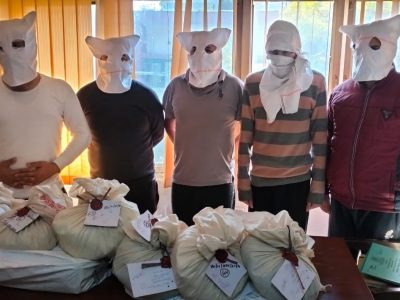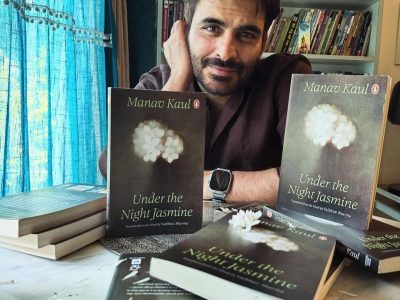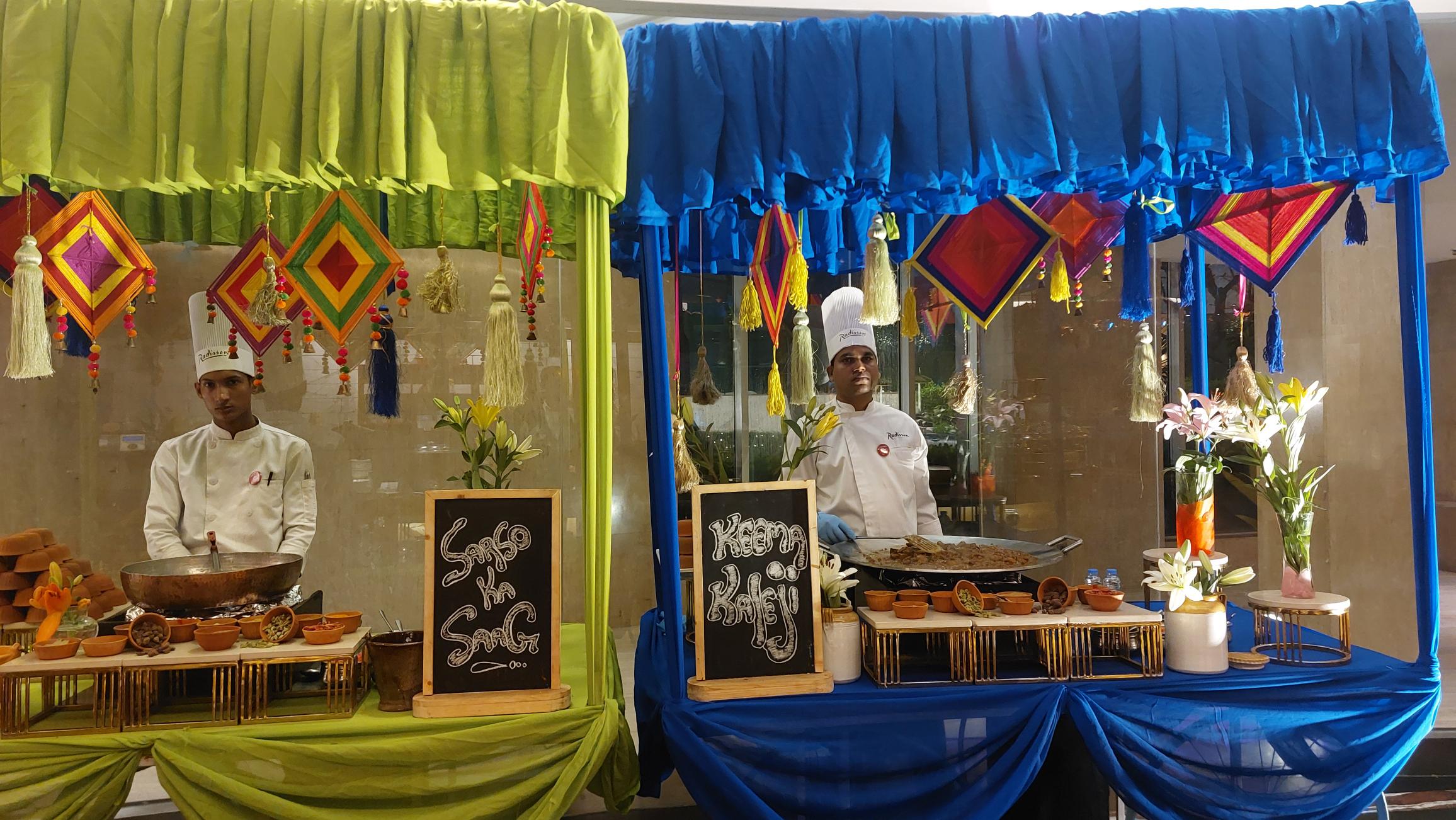How India’s most widely read newspaper, Dainik Jagran, published a highly misleading and inflammatory article
On September 19, readers of Dainik Jagran, the most widely read newspaper in the country, woke up to a disconcerting headline: “Having lost one daughter to love jihad, second one now in danger”. This appeared in the city section of the newspaper and concerned a series of events that took place in Sangam Vihar — a densely populated low-income neighbourhood in South Delhi.
“The roots of love jihad are fast spreading in the tense lanes of Sangam Vihar,” read the opening line. The article told the story of a family whose elder daughter had been “trapped” and “taken away” by a Muslim man named Sabeer. Her younger sister was now being harassed by Sabeer, his brothers and other friends.
Newslaundry, however, found the Jagran report to be misleading in many respects, particularly the allegation of “love jihad”. That’s mainly because it does not include the perspectives of the elder daughter or the police. Taking them into account changes the story entirely.
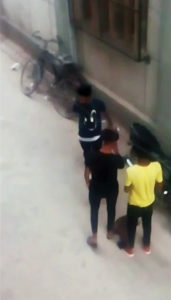
The Jagran story revolves around a middle-aged man. He and his wife have three daughters and a son. The youngest daughter, 19, and the son, 14, live with their parents. The eldest daughter is married. The one “trapped in love jihad” is Poonam, 23, who recently graduated from Delhi University.
According to the Jagran story, Poonam was “lured” into converting to Islam this April while she was working at a store in nearby Govindpuri. At work, a female Muslim colleague started talking to Poonam about Islam and made her wear amulets. Soon, she was taking Poonam to meet her cousin, Sabeer, at his house. Fifteen days into her job, Poonam stopped showing up at work. When she went home, her parents saw her neck, hands and shoulders were bruised. She said she had fallen off a rickshaw. The next day, on April 17, she went missing from home. When her parents finally contacted her over the phone, she told them she had married Sabeer.
When Poonam’s parents approached the police, says the Jagran story, “The police called Poonam and Sabeer to the police station and recorded their statements. Since both are adults, the police took no further action”.
The Jagran reporter, Arvind Dwivedi, used three call recordings to back his claims. The recordings, accessed by Newslaundry, contain conversations between Sabeer and his friends as well as Poonam and her Muslim colleague, among others.
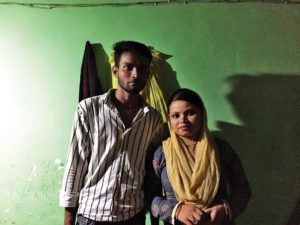
Wat’s the reality?
The Jagran report claims that Sabeer’s friends are heard telling him that Poonam should not change her statement before the police. She should say she left home of her own will and not contradict this after meeting her parents, who too were supposed to be at the police station.
What the Jagran report does not say is that the voice in the recording telling Sabeer that Poonam should not change her statement is that of a man named Raj, a neighbour and a friend of Sabeer’s. Newslaundry learnt that Raj is not a Muslim. The Jagran report cleverly omits this information.
In another recording, Poonam can be heard telling a police officer that she left her home of her own accord. “The boy’s family does not mind, but my family is troubling me,” she tells the officer. The Jagran report omits this too.
In fact, the recorded conversations about Poonam’s statement have to be seen in the context of her relationship with her parents. They show that she is being advised not to fold under family pressure rather than being tutored to make a false statement, as Jagran insinuates.
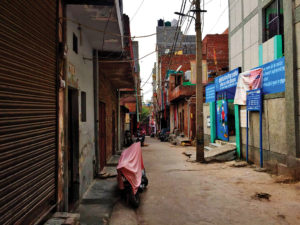
The Jagran report, which seeks to tell the story of a Hindu girl brainwashed into marrying a Muslim, was written solely from the point of view of Poonam’s father. This made it easier for the paper to present the whole affair as a scare story of “love jihad”.
At her small house in Sangam Vihar, barely 200 metres away from her parent’s house, Poonam told Newslaundry that she had moved to Sabeer’s house because she wanted to. Sabeer, a lanky 22-year-old who delivers morning milk in the area, said, “Yeh mujhe bhaga ke layi hai. Main nahin.” (She is the one who wanted to elope, not me).
According to Poonam, her parents had been pushing her to marry an “old man” with a government job since January this year. The man was first introduced to Poonam’s elder sister, who is 27, but he insisted on wanting to marry Poonam.
She did not want this. Contrary to Jagran’s claim that Poonam had known Sabeer for barely two weeks, they have known each other for around four years. “Their affair has been going on for two years. The whole neighbourhood knew about it,” a neighbour of the family told Newslaundry.
But Poonam was aware that her family would not entertain the prospect of her marrying a Muslim. “They hate Muslims. I’ve seen it growing up. I knew they wouldn’t approve,” she said.
It was true. “We hate Muslims,” said Poonam’s father. “We don’t even let them enter our house.”
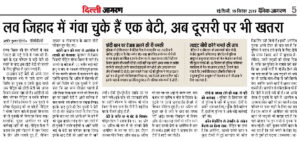
The father, who moved to Delhi from Bihar three decades ago, works in a textile factory in Noida and earns Rs 10,000 per month. Soft-spoken and diminutive, he lamented that the one time he gave some liberty to his daughter, she ran away with a Muslim. “Modiji said Beti bachao, beti padhao. We did it and this is what we’re going through now,” he said.
Poonam’s mother has not been well since her daughter left. “I would have made peace with myself even if she went to a good Muslim family. But they are a bunch of louts and criminals. I raised my daughter for 23 years and now she cannot meet me for 23 minutes,” she said, breaking into a sob.
On April 17, while her mother was out to buy milk, Poonam left the house. She hasn’t returned since. “If I go back, they will put a lot of pressure on me. I know how it will play out. I will meet my mother but not now,” said Poonam.
Asked whether she was married and had converted to Islam, she responded, “Yes, I am a Mohammedan. It’s because I have to live here. It was my choice. We had gone to do a court marriage, but my parents refused to part with my identity proof and other documents. So we went to Panipat and had a nikah in a masjid on April 26.”
Poonam and Sabeer told the police as much in late April. After Poonam’s parents complained to the Sangam Vihar police station about their daughter’s alleged abduction, the police summoned the couple. “Their union is by choice. They told us this in a statement,” Yogesh Malhotra, SHO of the Sangam Vihar station, told Newslaundry.
Asked what the couple thought of the “love jihad” spin on their story, Poonam pulled a funny face. Sabeer asked acerbically: “Two of my own sisters ran away with Hindu boys. Does that make it counter love jihad?” One of the sisters is Jinnat, the girl Jagran claims was Poonam’s colleague and had taught her about Islam and made her wear amulets.
Contrary to Jagran’s claim, the owner of the Govindpuri shop who employed Poonam told Newslaundry that Jinnat never worked there. Poonam’s father, who gave this information to the Jagran reporter, claimed that the shop owner had told a relative of his about Jinnat over the phone. The relative then conveyed it to Poonam’s father.
‘Sister’s harassment’
The Jagran story claimed that after Poonam left to live with Sabeer, her younger sister was intimidated by Sabeer’s brothers and his friends. They allegedly threatened to molest her, kidnap and throw acid on her.
Poonam’s mother repeated this claim and alleged that Sabeer and others hang around near her house, take drugs and harass the family. “They once flashed a knife at me and tried to break into the house. They told my youngest daughter that we have abducted your elder sister. Now we’ll abduct you,” she said.
On May 6, the Sangam Vihar police filed an FIR against Sabeer, his brother Zahid and his friend Feroz. Poonam’s family had produced videos of Zahid and Feroze outside their house chatting loudly. The police arrested the two but they were given bail by a local court after 17 days. Poonam’s mother claimed the men have since resumed lurking outside her house.
Police sources told News-laundry that bail was given to the accused because the family could not prove their claims in court. “The judge pointed to the fact that the men live nearby and therefore lurking in the neighbourhood doesn’t constitute harassment,” the source said.
Poonam’s family is crying inaction on part of the police. Moreover, soon after his youngest daughter was allegedly harassed, her father got in touch with the Rashtriya Swayamsevak Sangh, whose members had helped the family approach the police and file the FIR. They asked him to send an email to Prime Minister Narendra Modi, Home Minister Amit Shah, the Supreme Court and the Delhi Police about the matter.
The subject of the email reads: “Regarding my daughter’s forced captivity by a Muslim man (Sabeer).” The email says Poonam was brainwashed by Sabeer and that the Sangam Vihar police’s investigating officer, Ajit Kumar Yadav, continues to shield him. Thanks to the email, the complaint was directed to Delhi Police’s Joint Commissioner of Southern Zone, who has been asked to investigate further.
In the meantime, Poonam’s younger siblings have joined local RSS shakhas. Her sister even participated in a two-week RSS camp in Lajpat Nagar in June. Her brother has been waking up early every other day to attend a nearby shakha.
“They teach us how to protect ourselves. They give us lessons in patriotism,” the girl told Newslaundry.
Conclusion
One can argue that Dainik Jagran’s tale of “love jihad” in Sangam Vihar is a piece of fiction masquerading as journalism. But even in a work of fiction, the characters, especially protagonists, tend to have a voice. In Jagran’s case, Poonam was the central character who was allegedly subjected to abduction and brainwashing. But she did not get a voice in the daily’s story — her father spoke on her behalf.
When she did speak, most of the allegations against her husband turned out to be false. The Jagran report, in fact, was a litany of her father’s prejudices. Had it decided against repeating his claims uncritically, as basic journalistic standards dictate, India’s most widely read newspaper would have avoided publishing a highly misleading story — one that could have inflamed communal passions.
www.newslaundry.com

